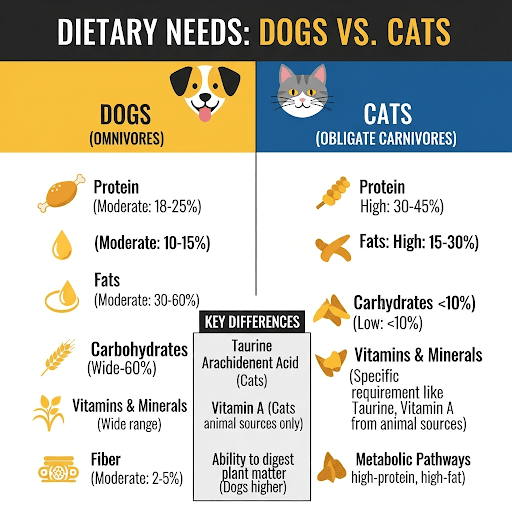As more people embrace plant-based lifestyles for ethical, environmental, and health reasons, it's a natural next step to wonder if our pets can—or should—do the same. The pet food aisle reflects this trend, with more formulas highlighting plant-based proteins in pet food like peas, lentils, and soy.
But a pet's nutritional needs are fundamentally different from ours. Before switching your pet's protein source, it's essential to understand the science and the profound biological differences between species. Let's break down what you really need to know about plant-based proteins for your dog or cat.
The Canine Conundrum: Can Dogs Be Vegetarian?
The short answer is yes, some dogs can do very well on a vegetarian diet. This is because dogs, unlike their wolf ancestors, are omnivores. Over thousands of years of domestication, they have developed key genetic adaptations—like an increased ability to digest starches—that allow them to utilize nutrients from both plant and animal sources effectively.
Common plant protein for dogs includes:
- Soybean Meal: A high-quality source that provides an excellent profile of essential amino acids.
- Pea Protein: Rich in iron and lysine, it's a common, highly digestible ingredient in grain-free foods.
- Lentils and Chickpeas: Offer protein, fiber, and other valuable micronutrients.
The key to a successful vegetarian diet for a dog is not the ingredients themselves, but the overall formulation. While a single plant source might not have every essential amino acid, a diet that skillfully combines multiple plant proteins can be just as "complete and balanced" as a meat-based one. For dogs with specific allergies to common animal proteins like chicken or beef, a veterinarian-prescribed vegetarian diet can be a lifesaver.
The Feline Fact: Why Cats Cannot Be Vegan
This is where the conversation takes a very serious and non-negotiable turn. Cats are obligate carnivores. This is not a preference; it is a biological necessity. Their bodies are specifically designed to derive their nutrition from animal tissue, and they lack the ability to synthesize several essential nutrients that are absent in plants.
For a cat, a meat-free diet is a recipe for severe illness and is life-threatening. Here are the critical nutrients they must get from meat:
- Taurine: This amino acid is vital for heart function, vision, and reproductive health. It is abundant in animal muscle tissue but absent from plants. A taurine deficiency leads to a serious heart condition called dilated cardiomyopathy (DCM) and blindness.
- Arachidonic Acid: Cats cannot synthesize this essential fatty acid themselves and must obtain it from animal fats.
- Pre-formed Vitamin A: Unlike dogs or humans, cats cannot convert beta-carotene (found in plants like carrots) into Vitamin A. They require the pre-formed version found only in animal tissue.
There is no scientific debate on this topic. A vegan diet is never appropriate for a cat.
Quality Over Source: What Really Matters
Ultimately, the conversation about protein should be less about the source (plant vs. animal) and more about the quality, digestibility, and bioavailability of the amino acids it provides. A highly digestible, high-quality plant protein is nutritionally superior to a poorly rendered, low-quality animal by-product.
The most important phrase on any pet food bag is "complete and balanced." This is a guarantee that the food provides every single nutrient your pet needs in the correct ratios for their life stage. Whether those nutrients are derived from chicken, lamb, or a carefully formulated blend of soy and peas (for a dog), it's the final nutritional profile that counts.
It's easy to get lost in the debate over single ingredients. The PetMealPlanner app helps you focus on what's truly important: the final nutritional profile of the food and whether it meets your pet's specific energy and nutrient requirements, taking all the guesswork out of the equation. (To understand what this guarantee on the bag really means, read our explanation of [What Does 'Complete and Balanced' Truly Guarantee?])

Conclusion: A Personalized, Scientific Approach
When it comes to plant-based proteins in pet food, there is no one-size-fits-all answer. Dogs, as adaptable omnivores, can thrive on a meticulously formulated vegetarian diet. Cats, as obligate carnivores, absolutely cannot, and for them, meat is a requirement for life.
The most critical takeaway is that you should never attempt to create a homemade vegetarian or vegan diet for your pet. These diets are incredibly difficult to balance and can lead to severe nutritional deficiencies. If you are considering a vegetarian diet for your dog for health or ethical reasons, it is imperative that you speak with your veterinarian or a board-certified veterinary nutritionist to ensure you are choosing a commercially prepared diet that is proven to be safe, complete, and balanced.


